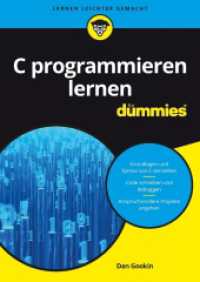- ホーム
- > 洋書
- > ドイツ書
- > Humanities, Arts & Music
- > Linguistics
- > general surveys & lexicons
Full Description
This book is dedicated to the issue of animal metaphor together with its intricacies and internal complexity. Its main objective is to present a unified picture of the role animal terms have played in the shape of English and other natural languages. The author addresses such aspects of animal metaphor as the problem of animal names used as surnames, so-called verbal and adjectival zoosemy, or the use of names of animal body parts with reference to people. The cognitively-oriented analysis is carried out in terms of the Conceptual Metaphor Theory, which is capable of accounting for semantic change in a panchronic perspective. The results show that virtually any facet of humanity, which is beyond the norm, may be viewed, perceived, conceived of and expressed in animal terms.
Contents
Contents: Metaphor as a Source of Cognitively Motivated Semantic Change - Complexity, Multidirectionality and Universality of Animal Metaphor - Transparency and Opaqueness of Zoosemy - Categorisation of Verbal and Adjectival Zoosemy - Zoosemy as Metaphor-Metonymy Interaction - Foodsemy as a Sub-type of Zoosemy - Various Mechanisms of Zoosemy-based Transfers.







